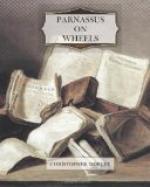Oh! the agonizing slowness of telephone connections when urgent hurry is needed! My voice shook as I said “Redfield 158 J” to the operator. Throbbing with nervousness I waited to hear the familiar click of the receiver at the other end. I could hear the Redfield switchboard receive the call, and put in the plug to connect with our wire. In imagination I could see the telephone against the wall in the old hallway at Sabine Farm. I could see the soiled patch of plaster where Andrew rests his elbow when he talks into the ’phone, and the place where he jots numbers down in pencil and I rub them off with bread crumbs. I could see Andrew coming out of the sitting-room to answer the bell. And then the operator said carelessly, “Doesn’t answer.” My forehead was wet as I came out of the booth.
I hope I may never have to re-live the horrors of the next hour. In spite of my bluff and hearty ways, in times of trouble I am as reticent as a clam. I was determined to hide my agony and anxiety from the well-meaning people of the Moose Hotel. I hurried to the railway station to send a telegram to the Professor’s address in Brooklyn, but found the place closed. A boy told me it would not be open until the afternoon. From a drugstore I called “information” in Willdon, and finally got connected with some undertaker to whom the Willdon operator referred me. A horrible, condoling voice (have you ever talked to an undertaker over the telephone?) answered me that no one by the name of Mifflin had been among the dead, but admitted that there was one body still unidentified. He used one ghastly word that made me shudder—unrecognizable. I rang off.
I knew then for the first time the horror of loneliness. I thought of the poor little man’s notebook that I had seen. I thought of his fearless and lovable ways—of his pathetic little tweed cap, of the missing button of his jacket, of the bungling darns on his frayed sleeve. It seemed to me that heaven could mean nothing more than to roll creaking along country roads, in Parnassus, with the Professor beside me on the seat. What if I had known him only—how long was it? He had brought the splendour of an ideal into my humdrum life. And now—had I lost it forever? Andrew and the farm seemed faint and far away. I was a homely old woman, mortally lonely and helpless. In my perplexity I walked to the outskirts of the village and burst into tears.
Finally I got a grip on myself again. I am not ashamed to say that I now admitted frankly what I had been hiding from myself. I was in love—in love with a little, red-bearded bookseller who seemed to me more splendid than Sir Galahad. And I vowed that if he would have me, I would follow him to the other end of nowhere.
I walked back to the hotel. I thought I would make one more try to get Andrew on the telephone. My whole soul quivered when at last I heard the receiver click.
“Hello?” said Andrew’s voice.




